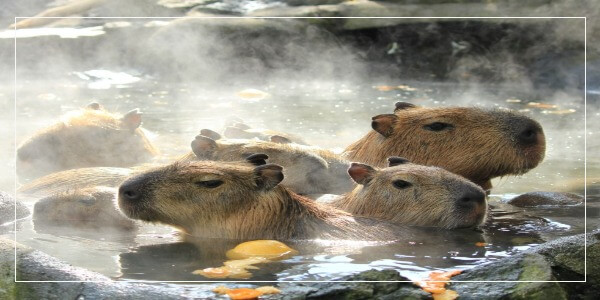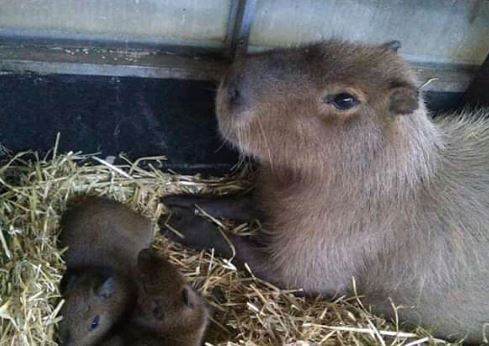Are Capybaras Worshipped By People?
In 2009, a capybara became a powerful symbol of Japanese resilience after the country suffered economic and natural disasters.
The question of whether capybara is worshipped perhaps makes more sense when you consider the historical, economic, and natural disasters that affected Japan in 2009. The country’s economy was suffering from a global recession and the aftermath of a financial crisis. Then, on March 11th of that year, a massive earthquake and tsunami tore through the northeast coast of Honshu. Thousands were killed or went missing. The National Police Agency estimated that 16,500 people died due to the tsunami; however, it is also estimated that 8,500 people are still unaccounted for today.
The disaster caused millions to lose their homes and forced thousands into temporary shelters; factories and businesses suffered damage as well. Japan’s economic progress slowed down greatly during this time period. It was undoubtedly a difficult experience for many Japanese people—but they persevered despite their struggles. The image of a capybara floating in water became an important symbol: it represented the resilience and fortitude of the Japanese people in light of these events.
Resilience is defined as “the capacity to recover quickly from difficulties,” according to Merriam-Webster Dictionary. In 2009, resilience meant showing perseverance after experiencing very challenging conditions. People were able to survive even though they had been displaced by natural disasters and could no longer rely on strong economic systems that had previously helped them weather other financial crises throughout history (such as the Asian Financial Crisis).
Japanese authors have written about our obsession with capybaras for decades.
Meanwhile, Japanese authors have been writing about our obsession with capybaras for decades. Hiroshi Nakamura’s novel _Capybara’s Lullaby_ is a collection of letters in which an unnamed protagonist writes to his wife about the road trip he and their son are taking.
The two are recovering from her death and trying to bond as they cross Japan in search of living capybaras. They’re aided by a sharp-tongued real estate agent who leads them through the underdeveloped towns where the capys live—but there’s something off about her too: She may be a ghost.
Yoko Ogawa wrote about pet capybaras in _The Diving Pool_, a short story collection centered on three siblings living with their parents at an inn in rural Japan. In “Dormitory,” she describes how one of the children is able to communicate with animals: “Whenever he passed by, dogs would start barking; cats would arch their backs or raise their tails, and even fish and waterfowl would be unable to hide their delight.”
Ancient Chinese signs also show the spiritual reverence for capybaras.
You might not be surprised to learn that capybaras were considered to be a sign of good luck and fertility in the ancient Chinese language. The Chinese word for capybara sounds very similar to the words for “abundance” and “come,” so the appearance of this creature was seen as a gift from heaven, which brings blessings and prosperity.
In addition, the ancient Chinese signs also show the spiritual reverence for capybaras. Capybaras have been used as a motif in ancient Chinese artwork, including pottery and figurines found in excavations dating back as early as the 10th century B.C.
We’re not alone in watching capybaras help us relax.
Their popularity has also given rise to a phenomenon called capybarame—a portmanteau of the words for “capybara” and “kawaii,” a Japanese word used to describe something as cute. Studies have shown that watching capybara videos can help people feel more relaxed, and in Japan, it’s common to see young people on their way to work or school hanging out with friends at designated capybara-viewing spots.
The animals are also associated with positive emotions such as happiness, love, and affection—qualities that make them ideal characters for children’s books and toys. Some parents even give their children stuffed toy capybaras before taking them out for their first trip on public transportation (to ease any anxiety about riding in crowds), or during potty training (as encouragement).
People are having “capybara parties” in Japan.
In Japan, you can rent a capybara. No, this isn’t the start of some bizarre joke about South American rodents and Japanese rental services. It’s real: the country is literally renting out its capybaras to people who want to have a “capybara party” that involves spending time with one of these animals.
As it turns out, there are several benefits to hanging out with capybaras that have nothing to do with your ability to make clever jokes about them after a night of drinking or playing Call Of Duty. Although they’re not particularly well-known in the U.S., capybaras have been found by researchers to have a calming effect on humans in general—and on those living in Japan specifically, where there is an increasing rate of depression and anxiety among citizens. In fact, the average number of days that workers take off for mental health reasons has increased from 1.9 days in 2004 to 3 days in 2016 alone.
Perhaps it’s no surprise then that many people would want to spend more time with these large rodents as a way of coping with their anxiety or depression—and if they can’t actually do so themselves (since they’re pretty much only found naturally in South America), then at least going out and watching one will do for now!
Capybaras have brought the world together with their sweet faces, and that is to be celebrated.
Do people worship capybara? Yes.
All humans see the world with a unique perspective, and our experiences and idiosyncrasies give us different things to draw from when we’re feeling overwhelmed—that’s why it can feel wonderful to share in a communal experience, whether it be through reactions on Twitter or hearing everyone you know to use the same slang term at the same time.
Capybara has been acting as an agent of this phenomenon for years, making us laugh together and bringing people together in the process. Among their many other uses, they provide an escape from reality without having to worry about forgetting what’s actually going on out there.


![Capybara Meat And Its Culinary Uses - [Every You Should Know] Capybara Meat & Culinary Uses](https://capybaratips.com/wp-content/uploads/2023/03/Capybara-meat-250x200.webp)




![How To Get A Capybara In China [Steps By Steps] China-Capybara](https://capybaratips.com/wp-content/uploads/2023/03/China-Capybara-250x200.webp)

